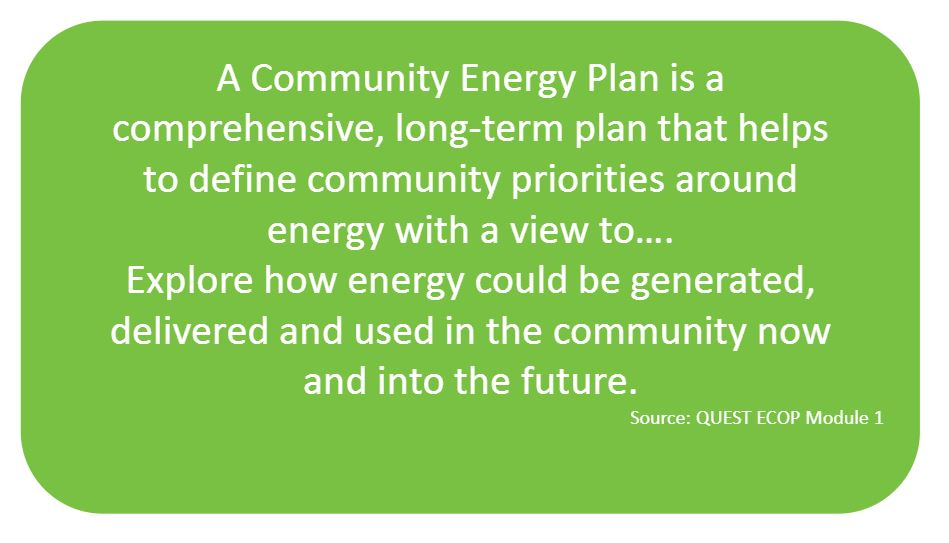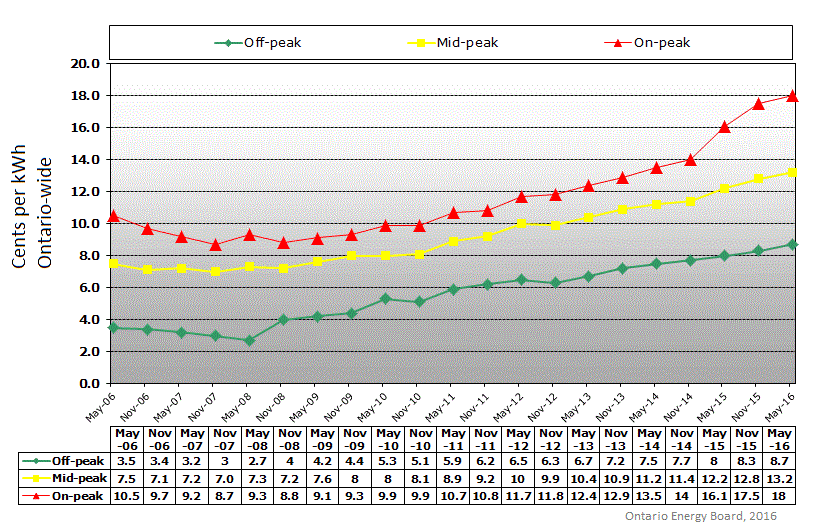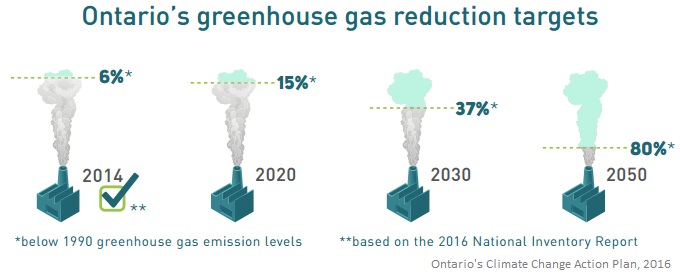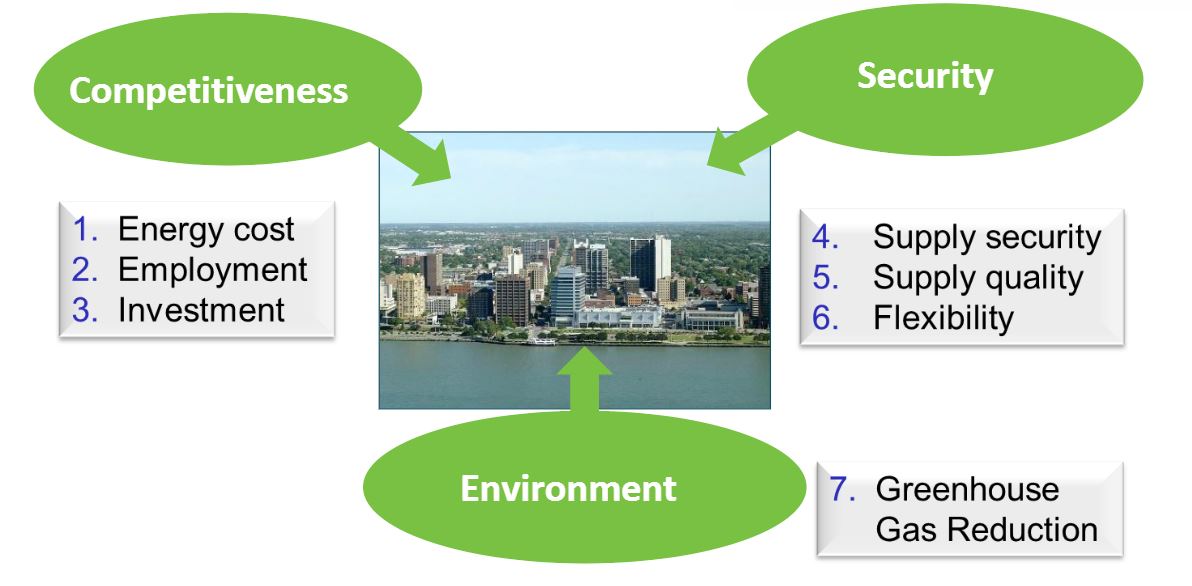Why a Community Energy Plan?

The Intergovernmental Panel on Climate Change has affirmed that warming of the climate system is unequivocal, and that human influence on the climate system is clear.
Recognizing the urgency of averting dangerous climate change, signatories to the United Nations Framework Convention on Climate Change, including Canada, in 2015 committed to significantly reducing greenhouse gas emissions in coming years. Likewise, Mayor Drew Dilkens committed Windsor to the Compact of Mayors, a global network of cities pledging to reduce greenhouse gases. In order for Windsor to balance its obligations to mitigate greenhouse gas emissions with economic vitality, a strategic, concerted plan is required.
 The price of energy is rising in Ontario, placing a hardship on individuals and businesses. For instance, between May 2006 and May 2016, the on-peak price for electricity has risen by about 8 cents per kilowatt hour. While mid-peak and off-peak prices have not risen as sharply over the same period in absolute terms, both have increased by more than 60%. A 2015 report by the Ontario Chamber of Commerce warned that one in twenty businesses may be forced to close over the next five years as a result of rising energy costs. Improving our understanding of how, where and when energy is used in Windsor will help the community identify opportunities for energy use programs focused on energy conservation and associated expenditures, fuel switching, opportunities for renewable energy generation or other smart energy-related efforts, and economic revitalization. The plan will help:
The price of energy is rising in Ontario, placing a hardship on individuals and businesses. For instance, between May 2006 and May 2016, the on-peak price for electricity has risen by about 8 cents per kilowatt hour. While mid-peak and off-peak prices have not risen as sharply over the same period in absolute terms, both have increased by more than 60%. A 2015 report by the Ontario Chamber of Commerce warned that one in twenty businesses may be forced to close over the next five years as a result of rising energy costs. Improving our understanding of how, where and when energy is used in Windsor will help the community identify opportunities for energy use programs focused on energy conservation and associated expenditures, fuel switching, opportunities for renewable energy generation or other smart energy-related efforts, and economic revitalization. The plan will help:
- Enhance local economic development: The Corporation of the City of Windsor spent in excess of $9 million in energy expenditure in 2014, while cumulatively our community spent approximately $842 million on energy (electricity, gasoline, diesel and natural gas) that year, or nearly $4000 per person in Windsor – at least 80% of which was not retained within the local economy. The Community Energy Plan will identify ways to retain some of that spending locally. Retaining just 1 per cent of the Windsor’s community's annual energy budget could generate more than $8 million in local economic wealth. An assessment by the City of London suggests their Community Energy Plan could help retain up to 15% of energy expenditure in the local economy, totaling $250 million.
- Reduce our carbon footprint: Windsor emits approximately 1.9 million tonnes of greenhouse gases every year. Under a business-as-usual scenario, Ontario’s emissions are forecasted to grow by 75%. To avoid this, all tiers of government in Canada have committed to reducing greenhouse gas emissions, including Windsor. The Community Energy Plan will help meet that target.
- Advance City priorities: The Environmental Master Plan lays out a goal of an efficient, healthy and livable city. The Community Energy Plan will help realize those priorities.
- Avoid added costs: Under a business-as-usual case, Windsor's $842 million expenditure on energy is forecasted to grow to between 1.8 and 3.2 billion per year by 2041. This includes a financial exposure of between $30-$60 million because of the provincial Cap-and-Trade carbon pricing program. Better managing our energy use will ensure lower future energy expenditure.
- Alignment with Provincial Energy Strategies: By undertaking a Community Energy Plan, the City of Windsor is aligning itself with Provincial and federal energy policy and programs. Ontario’s energy world is rapidly evolving, and steps need to be taken to ensure Windsor is not left behind. The Province of Ontario has committed to reduce emissions by 37% by 2030 and 80% by 2050 compared to 1990 levels, and expects Windsor to do its part to facilitate those goals.

The City of Windsor can expect a number of key benefits to arise from the implementation of a Community Energy Plan, including:
- Building awareness of energy use, energy generation and supply, energy efficiency and conservation principles;
- Informing the municipality about its energy consumption patterns by sector;
- Identifying opportunities to conserve energy and initiate green energy solutions;
- Helping develop long-term strategies to implement conservation and green energy solutions throughout the municipality;
- Enabling the engagement of other sectors and stakeholders in the community who have an important stake in energy;
- Identifying areas for alignment with regional energy planning;
- Considering the impacts of future growth and options for clean energy generation;
- Creating economic development opportunities/attracting private investment for new energy projects; and,
- Encouraging conservation and/or local energy projects that may create local jobs to increase energy efficiency and produce and maintain local sources of energy

The Community Energy Plan results in a Windsor that is more economically competitive, energy secure and environmentally responsible.
The Federation of Canadian Municipalities and Ontario Ministry of Energy generously provided funding to facilitate the completion of Windsor CEP.
Lura Consulting, ICLEI Canada and Garforth International, llc were retained by the City of Windsor to aid in the development of the CEP.
For more information on Environmental Initiatives
Phone: For general information, call 311. For detailed inquiries, call 519-255-6100 ext. 6109.
Email: emp@citywindsor.ca
